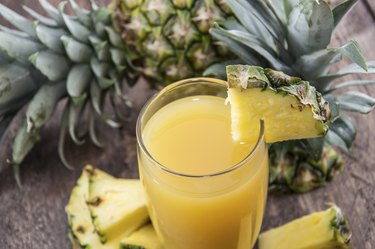
Snacking on pineapple or drinking pineapple juice while pregnant can help provide you and your developing baby with vital nutrients. While some people worry about the safety of pineapple during pregnancy, these fears are mostly based on misconceptions.
Here's everything you need to know about pineapple and pregnancy, including the health benefits and possible side effects.
Video of the Day
Video of the Day
Is Pineapple Good for Pregnant People?
Pineapple is full of vitamins, minerals and other nutrients. As a result, it's a healthy and safe part of a balanced pregnancy diet, according to the Mayo Clinic.
According to My Food Data, a serving — that's 1 cup, per the USDA — of pineapple contains:
- 83 calories
- 22 g carbs
- 2.3 g fiber
- 16 g sugar
- 0.9 g protein
- 11% of the daily value (DV) of thiamin
- 88% DV vitamin C
- 7% DV folate
- 5% DV niacin
- 67% DV manganese
- 20% DV copper
- 5% DV magnesium
Not only are these nutrients good for you, but they're good for your baby, too: For instance, pineapple is high in vitamin C, which helps with fetal tissue growth, according to a November 2018 study in the Nutrition Journal.
Pineapple also provides small amounts of iron and folate, both of which contribute to fetal development and can help prevent premature birth, according to the World Health Organization.
The fruit is also a great source of fiber, a nutrient that helps support healthy digestion, control pregnancy weight gain and prevent common issues like constipation and blood sugar spikes, per the Mayo Clinic.
Can You Drink Pineapple Juice While Pregnant?
You can also get many of the same nutrients from fresh pineapple juice, according to the USDA: For instance, one cup of juice contains 120 percent of your DV of vitamin C.
However, it's best to avoid processed pineapple juices or concentrates, which can contain added sugars that don't provide any nutritional benefit, per the Mayo Clinic. You also lose most of the fiber through juicing, so the Mayo Clinic recommends sticking to whole fruit to get as many nutrients as possible.
Pineapple and Labor
Some old wives' tales recommend pineapple to induce labor because the fruit contains a type of enzyme called bromelain that is thought to help soften the cervix.
However, evidence to support this claim is lacking, per December 2016 research in the Journal of Ethnopharmacology. Besides, the amount of bromelain in a typical serving is negligible because most of the enzyme is found in the pineapple core, which you typically don't eat.
Safety Considerations
While pineapple can be a nutritious addition to your pregnancy diet, there are a few things to keep in mind while snacking on the fruit.
1. Gestational Diabetes
Pineapple juice may not be the best choice for pregnant people with gestational diabetes, a type of high blood sugar that develops during pregnancy, per the U.S National Library of Medicine (NLM). That's because pineapple juice (and other fruit juices) can contain added sugars or more concentrated natural sugars while also having less fiber than the whole fruit, which may cause your blood sugar to spike.
If you have gestational diabetes, you can still drink pineapple juice while pregnant as a small part of a meal containing vegetables or proteins, both of which help keep your blood sugar under control, according to the NLM.
Pineapple or no pineapple, you can also work with your doctor to craft a gestational diabetes pregnancy diet plan that's best for you.
2. Heartburn
If you're prone to acid reflux, the acidity of pineapple could cause heartburn, according to the NLM. If you notice reflux when you snack on the fruit, it may be more comfortable to eat low-acid foods instead, like:
- Avocados
- Melon
- Pears
- Watermelon
- Bananas
3. Digestive Problems
Pineapple is full of vitamin C. But too much vitamin C from pineapple and other foods — which would be about 2,000 or 3,000 milligrams per day, per Harvard Health Publishing — can lead to digestive upset, including symptoms like:
- Stomach discomfort
- Nausea
- Diarrhea
Luckily, pineapple only has about 79 milligrams of vitamin C per serving, according to My Food Data, so it's unlikely to cause these issues by itself.
Can Pineapple or Pineapple Juice Cause Miscarriage?
Short answer? No.
Though eating pineapple and drinking pineapple juice have been rumored to cause miscarriage in early pregnancy, there is no evidence that pineapple or its juice causes pregnancy loss.
Adding Pineapple to Your Pregnancy Diet
A cup of fresh pineapple alone is a quick and nutritious way to add fruit to your pregnancy diet. But if you're in the mood to cook, you can add it to a salad, sandwich or try the below recipes for other delicious ways to munch on pineapple while pregnant:
- Tropical Superfood Smoothie Bowl (386 calories)
- Cauliflower Thai Fried Rice (273 calories)
- Grilled Banana Split Breakfast Bowl (653 calories)
- U.S National Library of Medicine: "Gestational diabetes diet"
- Harvard Health Publishing: "By the way, doctor: What's the right amount of vitamin C for me?"
- U.S. National Library of Medicine: "Gastroesophageal reflux - discharge"
- Journal of Ethnopharmacology: "Investigation of uterotonic properties of Ananas comosus extracts"
- USDA: "Fruits"
- My Food Data: "Pineapple"
- USDA: "Pineapple Juice"
- Mayo Clinic: "Is juicing healthier than eating whole fruits or vegetables?"
- Mayo Clinic: "Added sugars: Don't get sabotaged by sweeteners"
- World Health Organization: "Guideline: Daily Iron and Folic Acid Supplementation in Pregnant Women."
- Nutrition Journal: "Maternal fruit and vegetable or vitamin C consumption during pregnancy is associated with fetal growth and infant growth up to 6 months: results from the Korean Mothers and Children's Environmental Health (MOCEH) cohort study"
- Mayo Clinic: "Pregnancy nutrition: Healthy-eating basics"
- Mayo Clinic: "How dietary fiber can benefit your pregnancy digestion"